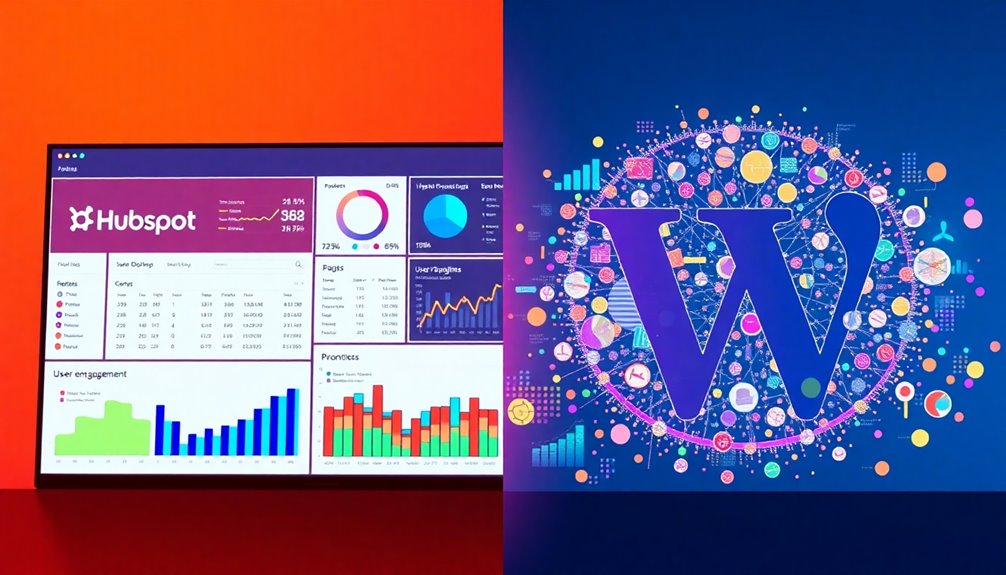When choosing between HubSpot CMS and WordPress, consider your needs. HubSpot offers a user-friendly experience with built-in analytics, secure hosting, and tailored content capabilities. However, WordPress provides extensive customization through themes and plugins, though it requires more maintenance. HubSpot includes integrated security features, while WordPress relies on external providers. If you want to explore their unique functionalities and costs further, you'll find additional insights that can help you make an informed decision.
Overview of HubSpot CMS and WordPress
When comparing HubSpot CMS and WordPress, it's clear that each platform has its strengths tailored to different user needs.
HubSpot CMS is a user-friendly, cloud-hosted all-in-one platform that integrates marketing automation, sales, and service tools, making it ideal for businesses focused on growth. It offers robust security features and built-in SEO tools, simplifying your digital marketing efforts. Additionally, its enhanced security features ensure that your website remains protected from cyber threats. Furthermore, security plugins can further bolster your website's defenses against potential vulnerabilities.
On the other hand, WordPress is an open-source content management system with over 60 million active websites, providing extensive flexibility and customization through themes and plugins. While WordPress is free to use, you'll need to evaluate costs for hosting and premium plugins. In addition, reliable hosting providers are essential to ensure optimal performance and security for your WordPress site.
Ultimately, your choice hinges on whether you prioritize an integrated solution or a highly customizable environment.
Editing Functionality
When you compare the editing functionality of HubSpot CMS and WordPress, you'll notice some key differences in user interface and customization options.
HubSpot's drag-and-drop editor allows for real-time editing without any coding, while WordPress often relies on plugins for similar features. This can affect how easily you manage your content and the overall user experience. Additionally, utilizing SEO optimization plugins can significantly enhance content visibility on WordPress sites. Moreover, many users find that employing popular form builder plugins improves their site's interactivity and user engagement. Regular backups with WordPress backup plugins are also crucial to protect your content against potential data loss.
User Interface Differences
While both HubSpot CMS and WordPress serve as powerful content management systems, their user interfaces differ markedly, particularly in editing functionality.
HubSpot CMS features a user-friendly interface with a drag-and-drop editor, allowing you to see changes in real-time. This makes managing content types straightforward and efficient.
On the other hand, WordPress's editing functionality can be less intuitive, often requiring you to rely on WordPress plugins like Elementor for a simpler experience, which can add complexity.
HubSpot's structured content management via HubDB enhances your ability to manage diverse content without needing extensive coding skills.
Customization Options Available
Customization is a key factor that sets HubSpot CMS and WordPress apart, especially regarding editing functionality.
HubSpot CMS offers a user-friendly drag-and-drop editor that makes content editing intuitive, perfect for users without technical skills.
While WordPress also provides drag-and-drop capabilities, it often relies on plugins like Elementor, which can complicate the process.
WordPress excels with its extensive customization options, featuring over 9,000 themes and 59,000 plugins that let you tailor your site to your needs.
On the other hand, HubSpot CMS enhances structured content management with HubDB, but limits users to built-in modules for customization.
To summarize, WordPress grants more design flexibility, while HubSpot CMS offers a straightforward editing experience.
Real-Time Editing Features
Real-time editing features considerably enhance the user experience in both HubSpot CMS and WordPress, making content creation more efficient.
HubSpot CMS boasts a user-friendly drag-and-drop editor that provides real-time front-end previews, allowing you to see changes instantly. This seamless interface, combined with HubDB for structured content management, simplifies handling complex data types.
On the other hand, WordPress offers drag-and-drop functionality through plugins like Elementor, but it often requires extra setup, making it less intuitive.
HubSpot's real-time editing streamlines updates without reloading pages, making adjustments quicker. Plus, its built-in SEO tools offer on-the-fly suggestions, optimizing your content as you create or modify pages, enhancing the overall editing experience.
Security

When it comes to security, HubSpot CMS offers robust built-in features that simplify protection for users. With SSL certificates, end-to-end encryption, and a web application firewall, you don't need to worry much about additional security measures. Additionally, implementing a strong password policy can further enhance your security, even in a platform like HubSpot. Regular backups are essential for safeguarding your data, as they help ensure business continuity in case of a breach or data loss.
In contrast, WordPress security heavily relies on your hosting provider and the plugins you choose, like Wordfence or Sucuri, to defend against vulnerabilities. HubSpot CMS also benefits from regular automated updates that enhance security without your intervention, while you'll need to keep up with updates on WordPress to mitigate risks. Furthermore, the closed-source nature of HubSpot CMS allows for controlled security measures, whereas the open-source framework of WordPress can lead to increased vulnerabilities if not properly managed. Additionally, regular backups of the database are essential to ensure that your data is recoverable in case of a breach or data loss.
Infrastructure
When it comes to infrastructure, HubSpot CMS takes the lead by handling all hosting management, security, and maintenance for you.
On the other hand, with WordPress, you're responsible for sourcing your own hosting, which can complicate costs and security. Choosing a hosting provider that supports PHP 7.4 or higher can greatly enhance your site's performance and security. This difference greatly impacts your experience and the reliability of your site. Additionally, choosing a reliable hosting provider can greatly enhance your site's performance and security. Ensuring your host provides dual-core CPU or better is essential for optimal site operation.
Hosting Management Differences
While both HubSpot CMS and WordPress serve as platforms for managing web content, their hosting management differs greatly regarding infrastructure.
HubSpot CMS is a cloud-hosted solution where HubSpot handles all aspects of hosting, including maintenance and security measures, ensuring a hassle-free experience for you.
On the other hand, WordPress requires you to source your own hosting providers, which can lead to varying performance and security vulnerabilities. WordPress users must also implement features like SSL and a Content Delivery Network (CDN) through plugins or hosting services.
Additionally, HubSpot CMS boasts guaranteed 99.95% uptime, while WordPress uptime can vary markedly based on the hosting service you choose.
Security and Maintenance
Security and maintenance are critical considerations for any website, especially when comparing HubSpot CMS and WordPress.
HubSpot CMS provides a secure hosting environment with built-in features like SSL certificates, firewalls, and DDoS mitigation, so you don't have to worry about managing security yourself.
In contrast, WordPress relies heavily on the hosting provider you choose, requiring you to implement your own security measures through plugins like Wordfence or Sucuri.
HubSpot CMS automatically rolls out updates, enhancing security without your intervention, while you must actively manage updates on WordPress to avoid vulnerabilities.
This proactive approach can lead to potential issues due to plugin conflicts, making HubSpot's managed infrastructure a more secure option overall.
Cost Considerations
After addressing security and maintenance, it's important to evaluate the cost considerations tied to infrastructure for both HubSpot CMS and WordPress.
HubSpot CMS offers a structured pricing model, starting at £0/month for the free version, with predictable costs as you scale. The Starter plan is £21/month, while the Professional plan is £315/month, covering hosting and security features.
In contrast, WordPress is open-source and free to use, but ongoing costs can add up quickly. Hosting fees can range from £3 to £70/month, plus additional expenses for themes, plugins, and security, leading to fluctuating expenses.
While HubSpot provides a thorough package, WordPress requires you to piece together your infrastructure, which can complicate budgeting.
Analytics and Data

Analytics and data play an essential role in understanding your website's performance and user engagement.
With HubSpot CMS, you get built-in, robust analytics that allow for seamless tracking without needing additional plugins. This integrated approach gives you a unified view of customer data, enhancing your reporting capabilities across marketing, sales, and service tools. Regular backups are crucial to ensure that your analytics data remains intact and secure. Additionally, maintaining a consistent backup frequency is essential to protect your analytics data from unforeseen disasters.
On the other hand, WordPress doesn't come with built-in analytics, so you'll typically need to rely on third-party plugins like JetPack or Monster Analytics. While both platforms prioritize access to data, HubSpot simplifies data exporting, allowing you to export nearly all your information easily. In contrast, WordPress may require multiple files and additional developer assistance, making HubSpot's analytics more user-friendly. Moreover, utilizing tools like Google Analytics can further enhance your insights into user behavior and site performance.
SEO Tools
Understanding how to optimize your site for search engines is just as important as analyzing user engagement.
HubSpot CMS shines with its built-in SEO tools, offering seamless keyword research, on-page optimization tips, and performance tracking. You won't need external plugins, making it easier to improve search visibility.
In contrast, WordPress relies on external plugins like Yoast SEO, providing advanced options for meta descriptions and SEO-friendly URLs, which allows for highly customizable SEO strategies tailored to your content and audience.
While both platforms let you track SEO performance metrics, HubSpot's unified analytics dashboard offers real-time insights, streamlining your SEO optimization efforts.
Choose the platform that aligns best with your marketing goals for effective SEO.
Website Personalization

When it comes to website personalization, HubSpot CMS stands out with its robust features that integrate seamlessly with user data.
You can easily enhance engagement rates by tailoring content based on visitor behavior and demographics.
On the other hand, WordPress often requires third-party plugins, making personalization a bit more complicated.
Personalization Features Overview
Personalization features play an essential role in enhancing user engagement on your website, especially when they adapt to individual visitor behaviors and attributes.
HubSpot CMS excels in this area, leveraging its integrated CRM to deliver personalized content experiences based on user behavior, such as location and past interactions. You can create dynamic content that adjusts to individual profiles, making your messaging more relevant.
HubSpot's Content Assistant even uses AI to recommend tailored content suggestions, streamlining your content creation process.
While WordPress can achieve some level of personalization through plugins, it often requires additional configurations and lacks the seamless integration that HubSpot offers.
Consequently, if personalization is a priority, HubSpot CMS might be the better choice for you.
Integration With User Data
HubSpot CMS takes website personalization a step further by seamlessly integrating user data through its built-in CRM. This integration allows you to create tailored content experiences based on user behavior and preferences, enhancing user engagement considerably.
With HubSpot's analytics capabilities, you can easily track customer interactions, leading to informed decisions about your content personalization strategies.
On the other hand, while WordPress offers some personalization options, it often relies on third-party plugins, which can complicate the process.
Although tools like OptinMonster can help with user data integration, they may not provide the same level of unified insights and automation that HubSpot CMS delivers.
Ultimately, HubSpot's approach to integration with user data guarantees a smoother and more effective personalization experience.
Impact on Engagement Rates
By leveraging advanced personalization features, businesses can see a significant boost in engagement rates. HubSpot CMS uses CRM-powered content personalization to tailor website experiences based on user behavior, enhancing engagement rates by 30% or more compared to generic content.
Its built-in analytics provide real-time tracking of user interactions, enabling you to make data-driven adjustments that elevate user engagement. In contrast, WordPress often relies on third-party plugins for personalization, which can complicate implementation and lead to inconsistent engagement rates.
HubSpot's AI Content Assistant quickly generates personalized content, ensuring relevance and timeliness. Additionally, HubSpot's integrated tools for forms and chat functionalities streamline lead capture, facilitating direct interactions that foster higher engagement rates without needing extra plugins, unlike WordPress.
Website Customization
When it comes to website customization, you'll find that HubSpot CMS and WordPress offer distinctly different experiences.
HubSpot CMS features a user-friendly drag-and-drop editor with real-time front-end customization, making it easy to design your site. However, it's limited in flexibility, relying on HubDB for structured content management.
In contrast, WordPress boasts over 9,000 themes and 59,000 plugins, allowing for unparalleled design freedom. You can modify themes easily through the admin panel, making it accessible for non-developers.
While HubSpot allows code-level customization requiring HTML, CSS, and JavaScript knowledge, WordPress's open-source nature provides a vast ecosystem for continual enhancements.
Since HubSpot's marketplace limitations, WordPress remains the go-to for extensive website customization options.
E-commerce Capability

While website customization sets the stage for your online presence, e-commerce capability takes it to the next level, especially for businesses looking to sell products.
When it comes to eCommerce capabilities, WordPress shines with its WooCommerce plugin, allowing you to set up your online store quickly and customize it extensively. In contrast, HubSpot CMS lacks a native eCommerce solution, requiring integrations for online sales.
Consider these key aspects:
- WooCommerce provides a vast array of add-ons and themes for eCommerce functionality.
- WordPress offers more flexibility for tailored shopping experiences compared to HubSpot's marketing automation focus.
- HubSpot CMS is better suited for businesses emphasizing marketing rather than direct product sales.
Choose wisely based on your e-commerce needs!
Blogging
If you're looking to create a blog, the choice between HubSpot CMS and WordPress can greatly impact your experience.
HubSpot CMS offers a user-friendly blogging platform with a WYSIWYG editor and built-in SEO tools, making content creation and optimization a breeze. You don't need technical skills to manage your blog effectively.
On the other hand, WordPress excels in extensibility, providing thousands of themes and plugins for customization. With WordPress, you can easily integrate tools like Yoast SEO for enhanced visibility and keyword optimization.
While HubSpot streamlines content management with real-time editing and categorized folders, WordPress supports various blogging formats, giving dedicated bloggers the flexibility they crave.
Choose the platform that aligns with your blogging goals.
Artificial Intelligence (AI) Functionality

Artificial intelligence is transforming how businesses engage with their audience, and the capabilities of HubSpot CMS and WordPress reflect this shift.
With HubSpot CMS, you get an integrated AI content assistant that streamlines content generation, offering tailored suggestions to meet your needs. Its AI tools analyze user behavior, providing valuable insights for personalized content that boosts user engagement.
On the other hand, WordPress lacks built-in AI functionalities but provides access to various third-party AI plugins for tasks like:
- Content generation
- Headline creation
- Basic analytics
While HubSpot's AI-driven analytics give a thorough view of customer interactions, WordPress relies on external solutions for similar insights, making HubSpot the superior choice for AI functionality.
Website Performance
As you consider how artificial intelligence enhances your content strategy, website performance plays an essential role in delivering that content effectively.
HubSpot CMS offers built-in tools like automatic image resizing and caching, which greatly boost website performance. It also supports Accelerated Mobile Pages (AMP), ensuring fast load times for mobile users—vital for user experience and SEO.
In contrast, WordPress relies heavily on third-party plugins for optimization, which can complicate site management and consume server resources.
Additionally, HubSpot's managed hosting guarantees a 99.95% uptime, providing consistent availability.
On the other hand, WordPress users must carefully select their hosting solutions, leading to potential variability in performance based on the provider and server settings.
Ongoing Cost

When it comes to ongoing costs, HubSpot CMS and WordPress present different financial commitments.
HubSpot CMS has tiered pricing, with plans starting at £0/month for the free version and going up to £1,050/month for the Enterprise plan. The Starter plan at £21/month is great for small businesses.
On the other hand, WordPress users face variable ongoing costs, which can include:
- Hosting expenses between £3 to £70/month
- Theme purchases from £50 to £200/year
- Plugin expenses ranging from free to £1,000/month
Additionally, security and maintenance costs for WordPress can reach £100 to £1,000/year, as you're responsible for updates and vulnerabilities.
Understanding these ongoing costs is essential for your budgeting and long-term planning.
Conclusion
In the battle of HubSpot CMS and WordPress, it's like choosing between a sleek sports car and a robust SUV. If you crave seamless integration and built-in features, HubSpot's your high-octane ride. But if you prefer customization and a vast ecosystem, WordPress is your trusted workhorse. Ultimately, your choice depends on your unique needs and goals, so pick the vehicle that'll drive your digital journey forward, steering you toward success in the online landscape.



